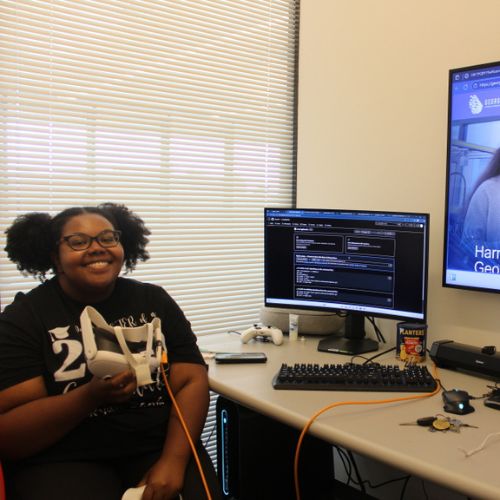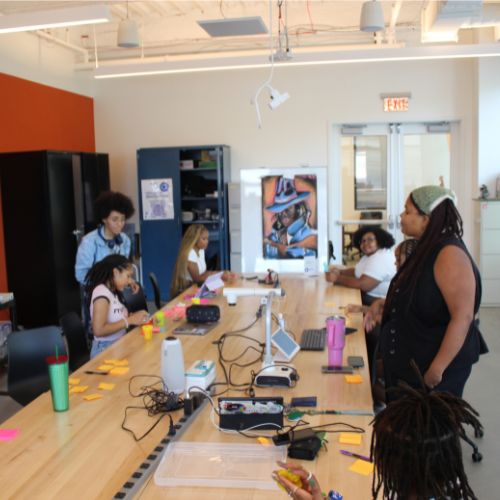Spelman College Collaborates with Georgia Tech to Pioneer VR Workforce Development in Groundbreaking Georgia AIM Project
From Campus to Assembly Floor, Spelman Sparks the Future
A groundbreaking initiative to revolutionize workforce development and mitigate future economic disruptions is underway, supported in part by the contributions of students and faculty from Spelman College. The Georgia Artificial Intelligence in Manufacturing (Georgia AIM) is a $65 million, statewide grant from the US Economic Development Administration’s Build Back Better Regional Competition. One of several projects within the grant, the Spelman virtual reality project is leveraging the talents of six Spelman College students to develop critical VR-based training simulations to quicken the onboarding of line workers for a Georgia auto manufacturer.
Developing the Auto Worker of the Future
The students work directly with the technical teams at Georgia Institute of Technology and Georgia Quick Start to develop a simulated assembly line for worker training. This cutting-edge, VR-based curriculum is being created for a single task at a single plant, but is expected to serve as the proving ground for upskilling in other tasks at other plants and industries.
“The project is for and by students. It is for students in the sense that it is helping build a program at Spelman from which current and future students will benefit. It is by students because, apart from direction and coaching by myself and other team members, the work is being done by Spelman students. This mainly entails implementing specific elements and/or capabilities in VR,” said Jerry Volcy, Ph.D., Brown-Simmons Professor in the Department of Art and Visual Culture.
By creating immersive, hands-on training that can be delivered quickly and remotely, the Georgia-AIM Project is poised to significantly enhance workforce development. This initiative provides invaluable, real-world experience for the Spelman students involved. It positions them at the forefront of a technological movement actively shaping the future of employment and economic opportunity across the state and potentially the nation.
Addressing Economic Disruption and Inequity
The Georgia AIM Project was conceived as a direct response to vulnerabilities in Georgia’s supply chain and manufacturing sector, exposed by the COVID-19 pandemic, cyber-attacks, and other disruptive forces. Volcy, a key faculty member involved, emphasized how the pandemic underscored the urgent need for rapid workforce retraining. “It displaced hourly workers, while knowledge workers shifted to remote work with far less income disruption. This highlighted the need to retrain the Georgia workforce quickly in times of rapid transition."
Crucially, this disruption disproportionately impacted women and people of color—demographics. Spelman, a historically Black women's college in Atlanta, is uniquely positioned to serve and uplift. The project aims to create a more resilient and equitable economic future by making rapid, accessible retraining a reality. "This experience has significantly sharpened my leadership skills by placing me in situations where my strategic thinking and decisive action were crucial for project success. As a Black woman innovator in a tech-driven, multidisciplinary space, it amplified my voice by demonstrating that my perspectives are valuable and essential. It fostered an environment where my contributions were actively sought after and respected, reinforcing my capability and empowering me to lead with confidence," said Devyn Washington, C'2026, a game design and development major from Rayne, Louisiana.
"This experience has significantly sharpened my leadership skills by placing me in situations where my strategic thinking and decisive action were crucial for project success. As a Black woman innovator in a tech-driven, multidisciplinary space, it amplified my voice by demonstrating that my perspectives are valuable and essential. It fostered an environment where my contributions were actively sought after and respected, reinforcing my capability and empowering me to lead with confidence," said Devyn Washington, C'2026, a game design and development major from Rayne, Louisiana.
"Working with Georgia Tech and Georgia Quick Start, I've gained firsthand experience in the professional applications of Virtual Reality. This experience has had a profound impact on my future career goals and educational path. It has provided me with practical experience in my desired career, solidifying my decision to pursue it. Additionally, working with Ph.D. and post-doctoral students from Georgia Tech has reassured me about my potential for graduate school.”
Her experience has helped her strengthen her leadership skills in tech spaces and deepen her commitment to using gaming for social good, laying the groundwork for how she envisions her future impact. Washington reflects a broader trend among Spelman students in the Georgia-AIM program who are harnessing emerging technologies to shape the future—each driven by a distinct vision and commitment to making a difference. “Working with these companies is very transformative! I am excited to discover how immersive training simulations can affect product knowledge for the greater good,” said Elikem Kalitsi, C’2025, a senior computer science major. “This project has shown me that there is absolutely a place for (Black) women like me to lead in emerging technology. It’s been empowering to grow my leadership and technical skills in an environment encouraging innovation, creativity, and representation. I feel grateful that Spelman provides space for students to hone their voices in computer science, innovation, and beyond.”
“Working with these companies is very transformative! I am excited to discover how immersive training simulations can affect product knowledge for the greater good,” said Elikem Kalitsi, C’2025, a senior computer science major. “This project has shown me that there is absolutely a place for (Black) women like me to lead in emerging technology. It’s been empowering to grow my leadership and technical skills in an environment encouraging innovation, creativity, and representation. I feel grateful that Spelman provides space for students to hone their voices in computer science, innovation, and beyond.”
Kalitsi, a Washington, D.C., native, is particularly interested in how technology can drive social impact—and sees this project as a launchpad for deeper exploration.
“This [Georgia AIM] experience has deepened my curiosity about the future of emerging technology,” she said. “There are still so many unanswered research questions, hardware advancements, and software discoveries. I plan to continue contributing to this field through graduate study or hands-on industry experience.”
Spelman's Innovation Lab Drives VR Development
 Spelman's involvement stems from an innovative shift within the College's curriculum during the pandemic. When the Innovation Lab was forced to operate remotely, it pivoted to launch a game development program to continue integrating technology into the liberal arts education of Spelman students.
Spelman's involvement stems from an innovative shift within the College's curriculum during the pandemic. When the Innovation Lab was forced to operate remotely, it pivoted to launch a game development program to continue integrating technology into the liberal arts education of Spelman students.
Volcy noted, "Gaming brings together artists, storytellers and technologists. The program proved popular with students, and interest in expanding it to include AR/VR technology persisted when we returned to campus. And importantly, unlike much of the equipment in the Innovation Lab, a game development program could be run remotely during the pandemic.”
Spelman Innovation Lab capabilities, aligned with Georgia Tech’s drafting of the Georgia-AIM proposal, helped build a broad coalition of stakeholders across Georgia — including non-traditional partnerships with local colleges. This synergy brought Spelman College into the project.
“That is how we got involved with Georgia-AIM,” Volcy said.
Spelman's Primary Goals: Building a VR Development Pipeline
- The core objectives for Spelman College in the Georgia-AIM collaboration are focused squarely on curriculum development and student career readiness in emerging technology. Volcy outlined the precise goals that have already been accomplished:
- Establish a sustained pipeline of VR Developers: The overarching aim is to ensure that, by the end of the grant period, Spelman has a continuous flow of graduates equipped to enter the workforce directly as skilled VR developers.
Transition game development from a co-curricular activity to a fully integrated curricular offering and developing the required courses. - Develop the necessary academic courses to support VR and game development education, and establish a research program to provide students with hands-on experience in VR technologies.
“We are looking forward to growing the ranks of engaged student researchers. We have also formed external partnerships and gained the support of several industry partners,” said Volcy.
The Georgia AIM Project reflects Spelman’s mission of academic excellence, social mobility and community impact.
“Community impact is at the heart of Spelman’s engagement. Through the work we are doing, we are hoping to make access to retraining more equitable. As VR technology becomes more ubiquitous, its potential for reducing barriers to retraining--be they transportation, costs or time--increases, making retraining opportunities accessible to larger population segments,” Volcy said.
“In terms of academics, VR technology and game development are a new modality for interactive storytelling. VR technology can be used for immersive historic reconstructions, training, education, visualization and entertainment.”
It is relevant to history, art, psychology, physics, education, computer science, and many other fields. The Innovation Lab integrates expertise across all these disciplines. According to Volcy, students gain experience in project planning, game production administration, and technical development. They also learn how business goals influence implementation, and how to gather and negotiate client requirements using their expertise. This immersive environment supports student learning while shaping the program's future.
